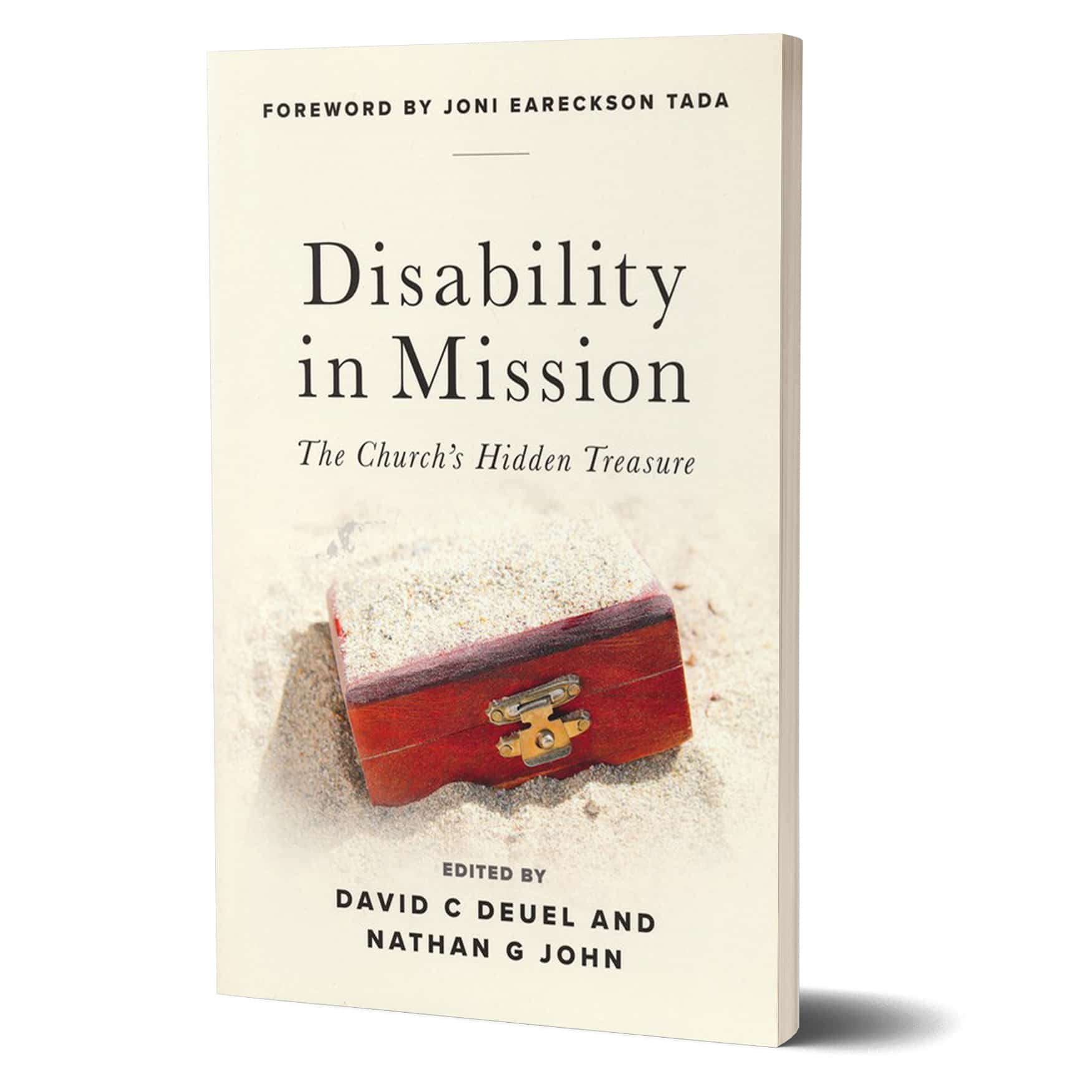Let’s Ask the Right Questions about People with Disabilities in Mission
 God’s drama of mission power and weakness
God’s drama of mission power and weakness
Mission is God’s theater before a watching world. Mission weakness is the set on God’s global stage to tell his story of power and sufficiency, the greatest story told since the dawn of time.
God displays his power through the weakness of his messengers, some of whom have disabling conditions. In so doing, he shows us our dependency and reveals his perfect and complete sufficiency. Our part includes not distorting God’s story with our misunderstandings of His mission power and our weakness.
George Scott on stage in God’s cosmic theater
In the pioneering days of modern missions, George Scott (1835-89) from Aberdeen, Scotland lost his leg in a farming accident. During his long recovery, Scott embraced the gospel and became convinced that God had called and gifted him for mission. When a doubter asked why he, having only one leg, had the audacity to go to China, Scott’s response was,
“I do not see those with two legs going, so I must.”
Scott’s answer reminds us that we must do our best to ask and answer the right questions.
Are we asking the right questions?
When we think about sending people with disability on mission, our minds immediately run to the challenges that might overwhelm them due to their perceived inabilities. With all good intentions, we might ask—
Will this person with disability be safe on mission?
What if this person with a disability fails?
These honest questions and others like them are rooted in genuine concern. But they miss the point. The biblical question that all—including people with disabilities—should ask is,
Has God called and gifted this person for mission?
After all, mission work can be unsafe for all people, disabled or not, and people without disabling conditions can fail too. What does God’s calling and gifting mean for the messenger who goes on mission? Five better questions should help clarify.
1.) Aren’t all God’s people called and gifted?
In at least six scripture passages, God reminds his people that all believers have gifts.[i] If God gifts those with disabling conditions to do his work, then aren’t they called? Does God gift people and not call them to exercise that gift? No, he does not. One of the most disheartening pronouncements made to a person with a disability is “We’re sorry but you are not called and gifted due to your disability.” Isn’t this a contradiction of Pauls’ statements that all are gifted? I believe that it is.
Let’s remind ourselves that the gifts God gives people are intended for the church’s growth, not for the possession of the individual.
People with disabilities are gifted, that is, they have gifts to support the church and its work. It should not surprise us that God would gift people with disabilities equally to those not disabled. These things said, another question begs answering.
2.) Didn’t Jesus commission all His followers to his mission?
When Jesus gave his great commission to his disciples, and by extension, those whom they would evangelize and disciple, did he in any way limit that call-to-duty to only those who did not have disabilities? Listen carefully to his words:
“All authority in heaven and on earth has been given to me. Therefore go and make disciples of all nations, baptizing them in the name of the Father and of the Son and of the Holy Spirit, and teaching them to obey everything I have commanded you. And surely I am with you always, to the very end of the age”
Matthew 28:18-20
Jesus sandwiched the actual commissioning statements with the assurance that he possesses all earthly power and that he will be present with them. In their weakness, Jesus’ messengers possess both Jesus’ power and His presence as they fulfill his mission. His great commission conscripted them for service, no one excluded.
3.) What has God done through people with disability on mission?
We have gathered together a central point from each of the Disability in Mission blogs from the last nine weeks that encourages us to include people with disabilities in the church’s mission. What has disability taught us about mission and how has disability helped his people do their work for him in mission?
Each of the blogs in this first series demonstrates that called and gifted people on mission succeeded—not in spite of their disability, but through it, even because of it. People with disability serving on mission have demonstrated clearly that disability—
- opens lines of communication to those who suffer (Natalie Flickner)
- builds rapport with people through weakness (Elinor Young)
- instructs others in God’s plan and purposes (Sarah Hirsch)
- challenges us all to rethink interpretations of mission passages (Daniel Aaron Harris)
- emboldens those struggling through suffering (Daniel Kyungu)
- raises up missionary leaders through vocations (Katie Leatherwood)
- improves plans for mission (Ismael Dora)
- disproves old negative arguments about missions (Ben Watson)
- increases and spreads mission impact (Bonnie Armistead)
These are just of few of the many mountains climbed, opportunities seized, and lessons learned from people with disabilities in God’s mission. Returning to God’s intention for missions, what are two of the most crucial questions we should ask?
 Has God displayed his power and glory in his theater of mission weakness?
Has God displayed his power and glory in his theater of mission weakness?
Thomas Brewster, veteran missionary and mission innovator, captured the paradox of losing power and control due to his suffering from quadriplegia. Paralyzed from a diving accident as a teenager, Thomas’s insights about his experience with disability in mission are invaluable. Tom said,
In many ways this accident has been a great blessing in my life. In fact, apart from the privilege of knowing Christ as Lord and Savior and the wonderful family that He has given me, this injury and the paralysis over these years have been the biggest blessing in my life. That may sound a bit strange and I’m sure that it’s nothing that any of us would ever wish for, but God has used this in away in my life to give me a sense of His leading and of His power.[ii]
God called, gifted, and commissioned Tom. In fact, Tom became a mission leader who innovated more effective ways to learn languages better and more quickly and who traveled all over the world to teach and consult on mission. His giftedness, which did not require the use of arms or legs, soon became obvious to all. It was manifest in his life’s purpose, his calling.
But perhaps most importantly, disability helped prepare Tom for mission. How so? Disability gave him an even greater desire for God’s power to work through his weakness. Would that all of us were weak enough to recognize God’s sufficiency and submit in dependency! Is it possible that people with disabilities are better prepared for mission than those who have not learned to depend on the God who sends them? Yes, because in their dependency on the Lord they have learned greater spiritual resilience.
But we must first be willing to listen to them.
Is there a common thread in all of these stories? Yes, by far the most common and perhaps the most crucial form of impact came in how disability prepared the person spiritually for mission. Ironically, disability supports mission through the weakness of God’s people. Weakened messengers do God’s work in their humility and dependency on the Lord of the mission. Isn’t this the way that God says he will complete his mission?
God called Moses to be his messenger to Israel and Egypt. It must happen through his mission power and presence in his messengers. In shocking form, Moses suffered from the one inability that he needed to perform the task God gave him. His speech. Scripture says that Moses was the most godly and impactful prophet in Israel (Deuteronomy 34:10-12).
How important is weakness in mission? Consider, “There are many people in ministry too strong to be useful. There are no people in ministry too weak to be useful.”[iii] There are no little people in God’s mission.[iv] All can and must play a role in doing God’s work according to their calling and giftedness.
We are left with one parting question:
Shouldn’t we, the church, accept the mission calling and gifting of people with disabilities, then train, send, and support them for mission?
It’s God’s story. Our part is to display our dependency and his power so that he will be glorified in our weakness. People with disability must pursue their mission callings and deliver their gifts to Jesus and his church.
[i] Romans12:3; 1 Corinthians 7:7; 1 Corinthians 12:7; 1 Corinthians 12:11; Ephesians 4:7; and 1 Peter 4:10.
[ii] Dan Brewster, Only Paralyzed from the Neck Down: The life and ministry of Tom Brewster (Pasadena, CA: William Carey Library, 1997), xiii.
[iii] Spoken by Dr. John MacArthur at Together for the Gospel conference, Twitter post by Richard Gregory, April 12, 2018, https://twitter.com/RichardPGregory/ status/984504149978042369.
[iv] An older but outstanding study on this topic is Francis A. Schaeffer, No Little People (Downers Grove: Intervarsity Press, 1974).
Written By—Dave Deuel
Dave Deuel is married with four adult children, one daughter has Down syndrome. He also has a sister-in-law who is intellectually disabled. He is Academic Dean Emeritus for the Master’s Academy International, Senior Research Fellow – Policy Advisor for the Christian Institute on Disability, and Catalyst for Disability Concerns, the Lausanne Movement. He served as Old Testament professor and department chairman at the Master’s Seminary for 10 years and in pastoral roles of local churches, five of which were church plants. He is currently elder for pulpit and interim pastor for area local churches in upstate New York.
 Disability in Mission
Disability in Mission
Disability in Mission: The Church’s Hidden Treasure outlines a radical change in approaches to missiology, missions, and praxis for the twenty-first-century global cultural context. It explores a pattern whereby God works powerfully in missions through disability and not in spite of it.
Pray with Us
Heavenly Father, we come before you requesting a miracle. Lord of disability, please change our hearts. We confess that we doubt or dismiss people with disabilities. But worse, we pridefully make them objects of pity when instead we should see your calling and giftedness in their lives.
Please use this book’s testimonies of your sufficient grace. May the many missionary lives lived faithfully with disability remind us that called and gifted people with disabilities are platforms for your enablement, showcases for your glory. Remind us that disability is your stage for shocking a watchful world.
We believe that you can and will heal all disabilities. But on your disability stage, display your power by changing our hearts.

 God’s drama of mission power and weakness
God’s drama of mission power and weakness
 Has God displayed his power and glory in his theater of mission weakness?
Has God displayed his power and glory in his theater of mission weakness? Disability in Mission
Disability in Mission



